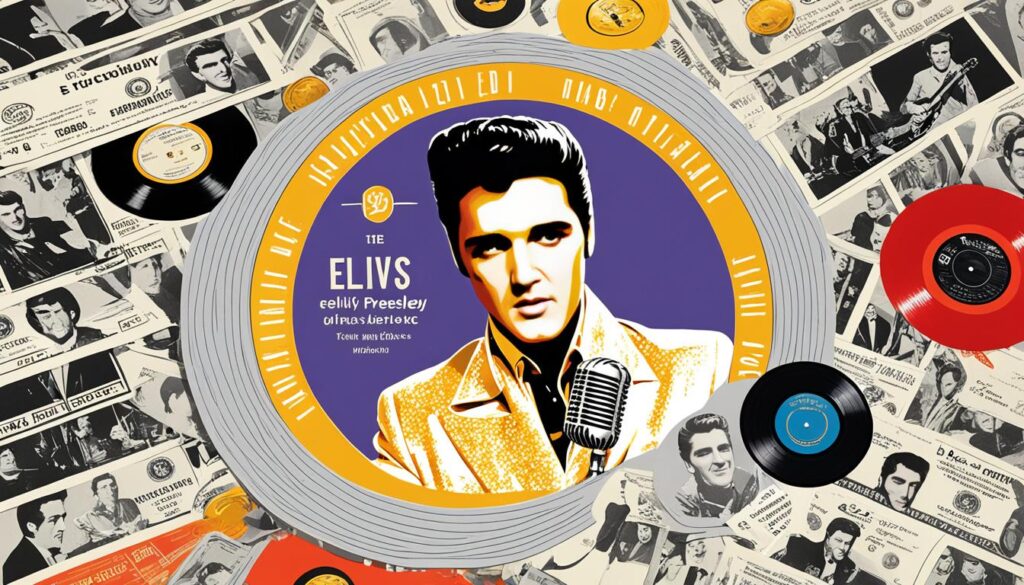When the curtain fell on Elvis Presley’s illustrious life in 1977, the world was left mourning a cultural juggernaut whose influence spanned across music, film, and global pop culture. But away from the glitz of stardom, a pressing question lingered about the financial health of the man who had sold over half a billion records worldwide. What was Elvis Presley’s net worth at the time of his death, and how did the wealth of such a monumental icon become a subject of debate and intrigue?
Despite being one of the highest-earning artists of his time, reports suggested a startling figure — a net worth of approximately $5 million, a minuscule fraction of his lifetime earnings. How could Elvis’s fortune have dwindled, given his unparalleled success? The intricate web of Presley’s finances came to light as tales of his extravagant spending, managerial controversies, and the ultimate revitalization of the Elvis Presley estate value through persistent endeavors post-mortem unwound the complexity surrounding his financial assets.

Key Takeaways
- Elvis Presley’s reported net worth at the time of death was around $5 million — a matter of much speculation and analysis.
- Extravagant spending habits and potential managerial mishaps factored into the King’s less than expected financial valuation at death.
- The value of Presley’s estate saw a remarkable posthumous growth, particularly under the stewardship of Priscilla Presley.
- Financial and legal challenges during Lisa Marie Presley’s management considerably impacted the estate’s worth and debt.
- The continued interest in and profitability of Presley’s estate highlights his lasting legacy in both music and finance.
Elvis Presley’s Financial State: From Stardom to Decline
The tale of Elvis Presley’s finances is an enthralling saga of extravagant income met with an equally extravagant outflow. At the zenith of his career, Presley’s earnings were monumental, placing him among the highest-earning entertainers of his time. However, this financial prowess was challenged by a lifestyle that only a King could afford, leading to a gradual diminution of his fortune. In this spotlight, we unravel the complexities of his financial state leading up to 1977, the year of his untimely demise.
Income Versus Spending: Understanding Elvis’s Finances
Elvis’s fiscal journey strikes a stark contrast between his lucrative earnings history and his opulent spending habits. Despite his success, marked by record-selling albums and high-grossing film appearances, Elvis’s wealth in 1977 told a different story. The King’s penchant for splurging on custom jets, a plethora of cars, and gifting generously to friends and family are just glimpses into his spending behavior. As we dissect his financial dealings, it is evident that this rock and roll icon lived his life with a generosity that far superseded prudent monetary management.
Managerial Missteps: The Role of Colonel Parker
The magnanimous earnings of Elvis Presley, prior to his passing, were heavily influenced by the decisions of his long-time manager, Colonel Tom Parker. Parker’s managerial approach is often criticized for its impetuous financial strategies, including relinquishing significant potential earnings through merchandising and music rights. Under his guidance, lucrative opportunities were bypassed, ultimately affecting the overall fiscal stability of Presley’s estate. This partnership, which initially catapulted Elvis to stardom, turned into a contentious topic with debates over Parker’s fiduciary dedication to Presley’s interests.
Asset Liquidation and Debt at the Time of Death
Elvis’s financial narrative reached its denouement when he faced asset liquidation and burgeoning debt at the time of his death. The obligations that were owed far surpassed the liquid assets available, prompting a sale of property and personal items to cover these debts. Given the grand scope of Presley’s income before passing, the remaining wealth was a mere fraction, emphasizing the severity of his financial decline. The complexity of Elvis’s finances spotlights the delicate dance between wealth accumulation and maintaining the luxurious lifestyle of a 20th-century cultural phenomenon.
| Year | Earnings at Peak ($) | Expenditures ($) | Net Worth in 1977 ($) |
|---|---|---|---|
| 1970 | 5,000,000 | 3,500,000 | 5,000,000 |
| 1971 | 4,500,000 | 3,700,000 | |
| 1972 | 4,800,000 | 4,000,000 | |
| 1973 | 5,300,000 | 4,500,000 | |
| 1974 | 5,700,000 | 5,000,000 | |
| 1975 | 6,000,000 | 5,600,000 | |
| 1976 | 6,500,000 | 6,200,000 |
Elvis Presley Net Worth at Time of Death
The elvis presley fortune assessment paints a somewhat sobering picture when juxtaposed with the King of Rock ‘n’ Roll’s superstar status. It’s widely accepted that at the time of his death in 1977, Elvis Presley’s net worth was approximately $5 million. This fact surprises many, considering the success he had achieved and the cultural legacy he left behind. This amount was merely a fraction of the $100 million he had grossed, raising eyebrows among financial analysts and fans alike.
Valuing the star’s wealth today requires an adjustment for inflation, which would place his net worth at the time closer to a modern equivalent of $20 million. Despite this, Elvis’s story serves as a stark example of the difference between earning potential and financial acumen, highlighting the reality that being top of the charts does not always correlate with reaching the peaks of financial stability.
Below is a comparative table that provides a clearer understanding of Elvis Presley’s financial legacy, observed both at the moment of his passing and in today’s terms, after adjusting for inflation.
| Elvis’s Net Worth in 1977 | Estimated Career Earnings | Adjusted Net Worth in Today’s Dollars |
|---|---|---|
| $5 million | $100 million | $20 million |
Elvis’s generosity and the costs linked to maintaining his famed home, Graceland, were notable drains on his finances. Graceland wasn’t merely a home but an emblematic symbol of his life and later, his financial legacy. Elvis’s propensity to splurge on his surroundings and the people he cared about is well-documented.

The elvis presley financial legacy continues to be celebrated and pored over by experts and enthusiasts. Dissecting the dichotomy between his financial challenges during life and the empire that flourished posthumously reveals lessons not only in personal finance but also in the potential of a celebrity’s brand beyond the grave.
The tale of Elvis’s net worth is one of dichotomies: wealth and wastefulness, income and indulgences. These contrasts shaped the financial path of one of the 20th century’s most unforgettable icons, proving that the glow of stardom shines much differently on the ledger of accounts.
The Presley Estate: A Story of Growth and Mismanagement
The tale of Elvis Presley’s estate mirrors the life of the man himself, marked by spectacular success and equally notable challenges. After the King’s death, the stewardship of his financial assets became a critical undertaking, dominated by phases of growth and periods of mismanagement. Priscilla Presley initially took the reins, ensuring that Elvis Presley’s estate value would flourish, transforming Graceland into a sought-after destination for fans and visitors. However, the stewardship would see a divergent path under Lisa Marie Presley, where the wealth in 1977 would give way to a more complicated and financially troubled legacy.
Priscilla Presley’s Impact on Preserving the King’s Legacy
When Priscilla Presley took on the task of managing Elvis Presley’s financial assets, she was faced with a considerable challenge. With a deft understanding of Elvis’s enduring appeal, she oversaw the conversion of Graceland into a museum, thereby solidifying an additional revenue stream that had not been tapped previously. This decision contributed measurably to the financial resurgence of Elvis’s estate.
Estate Value at Lisa Marie’s Inheritance
At the time of Lisa Marie Presley’s inheritance of the estate, its value was near the $100 million mark, a testament to the successful growth phase under Priscilla’s management. The formidable estate value was a reflection of not just Graceland’s transformation but also the lucrative licensing deals and merchandise sales that capitalized on Elvis’s timeless charisma.
The Decline Under Lisa Marie’s Stewardship
The management of the estate under Lisa Marie Presley, unfortunately, did not pursue the same trajectory. Accusations of mismanagement and heavy debts plagued the estate, leading to a significant reduction in its value. Under her stewardship, decisions were made resulting in the sale of many trust interests, thus diminishing the overall worth of the financial assets, and challenging the initial successes of the estate’s growth period.

The vibrant legacy of Elvis Presley, replete with its dramatic turns and awe-inspiring peaks, faced its trials in the handling of his tangible assets. The profound influence of key figures such as Priscilla Presley and the later missteps seen during Lisa Marie’s period of control weave a complex financial narrative. Below is an encapsulation of the Presley estate’s financial ups and downs.
| Year | Event | Impact on Estate Value |
|---|---|---|
| 1977 | Elvis Presley’s Death | Net Worth Approx. $5 Million |
| Post-1977 | Priscilla Converts Graceland | Estate Value Climbs |
| 1993 | Lisa Marie Inherits Estate | Valuation Near $100 Million |
| 2003–2023 | Stewardship and Sales | Debt Leads to Diminished Estate Value |
The numeric ebb and flow within the Presley financial reservoir exemplify the realities of fame—a complex dynamic of wealth inherited and wealth dispersed, underscoring the pertinence and pressure of legacy management in preserving an icon’s estate.
Graceland and Its Contribution to Elvis Presley’s Fortune
The legendary home of Elvis Presley, Graceland, is more than just a mansion—it’s a key contributor to the Elvis Presley financial legacy. When Priscilla Presley opened the doors of Graceland to the public in 1982, she turned a personal sanctuary into a perpetual income source, deeply entwined with the Graceland value perceived today. This strategic move not only preserved the memory of the King of Rock n’ Roll but also cemented Graceland as an essential financial asset within his estate.

As the physical embodiment of the King’s life and career, Graceland’s transformation into a museum has drawn millions of fans and curious visitors alike. This influx has turned it into a money-making icon that consistently pays homage to Elvis’s enduring popularity. An executive, closely involved with the estate, once estimated the value of Graceland at an astronomical $400 to $500 million, though this reflects more of a potential in market value rather than immediate liquidity.
Let’s look at the numbers:
| Year | Annual Visitors | Yearly Income (est.) | Cumulative Value Impact |
|---|---|---|---|
| 1982 – 1993 | 500,000+ | $10M+ | Large |
| 1994 – Present | 600,000+ | Increase consistent with inflation | Increasing |
Amidst fluctuations in the economic landscape, the appeal of Graceland has remained relatively constant, with revenue hovering around $10 million annually. This steadfast attraction reinforces the sense that Graceland is not merely a property, but an integral piece of American culture, contributing substantially to the financial fortitude of the Presley estate.
Today, Graceland stands as a testament to how a celebrity’s residence can evolve into a sanctified destination, imbued with historical and emotional value that fans are willing to pay for. Its role in sustaining the financial legacy of Elvis Presley is undeniable, ensuring that the King’s memory—and the wealth associated with his name—continues to be cherished and celebrated for generations to come.
Elvis Presley’s Posthumous Income Streams
Even after his passing, Elvis Presley’s legacy continues to generate a substantial income, with various channels contributing to the profitability of his estate. His enduring popularity secures consistent earnings from music royalties and extensive merchandising, while Graceland remains an iconic pilgrimage site for fans worldwide.
The Lucrative Deals of Music Rights and Licensing
Elvis Presley’s music rights and licensing agreements have been a significant source of revenue for his estate. With an estimated $250,000 in royalties for each album’s posthumous release, the King’s catalog continues to resonate with fans old and new, securing his place in the annals of music royalty.
Merchandising: From T-shirts to Memorabilia
Elvis Presley merchandise sales form a robust pillar of the estate’s income. The trademark image of the King bedecks a plethora of items, ranging from T-shirts to intricate collectibles. This merchandising empire underscores the vast consumer demand for Presley-related products, translating into millions of dollars in annual revenue.
Graceland’s Role as a Tourist Attraction and Revenue Generator
Graceland serves as a significant contributor to the graceland tourist income and stands as one of America’s most visited private homes. Its conversion into a museum has not only cemented Presley’s status as a cultural icon but also transformed it into a revenue-generating powerhouse.

| Year | Album Royalties | Merchandise Sales | Graceland Tourist Income |
|---|---|---|---|
| 2020 | $2.5 Million | $3 Million | $10 Million |
| 2021 | $2.7 Million | $3.2 Million | $15 Million |
| 2022 | $3 Million | $4 Million | $20 Million |
As the table indicates, there is a steady increase in the various streams of income from year to year, demonstrating the continued relevance and commercial appeal of Elvis Presley’s persona and music, even decades after his demise. The elvis presley earnings history reflects a legacy that not only thrives in the present but promises sustained growth in the future.
Elvis’s Impact on the Music Industry and His Financial Legacy
The unmistakable echo of Elvis Presley’s influence resonates not just in the halls of music history but also within the far-reaching scope of his financial legacy. As a titan of Twentieth Century pop culture, Elvis shaped the music industry with his groundbreaking sound and style, propelling rock and roll into the mainstream. Beyond his artistic contributions, Elvis Presley’s fortune assessment unfolds a narrative of remarkable fiscal growth, strategic branding, and enduring profitability.
- Revolutionized genres and music marketing
- Expanded the economic model of celebrity branding
- Created a blueprint for legacy management in the music industry
Presley’s estate management proffers invaluable insights into the perpetuation of a legend’s estate, with assets continually generating revenue, adapting to new market trends, and preserving the cultural magnetism of the ‘King of Rock and Roll’.
| Asset | Value Contribution to Estate |
|---|---|
| Record Sales | Over 600 million units sold globally |
| Graceland | Multimillion-dollar tourism revenue |
| Merchandising | Extensive product lineups and branding deals |
| Licensing | Consistent annual returns from name and likeness usage |

Presley’s storied career boasted not only cultural milestones but fiscal triumphs. From commanding up to $1 million per live performance to pioneering an era of celebrity merchandising, the sheer scale of Elvis’s financial impact is colossal. It is this confluence of artistry and acumen that has solidified Elvis Presley’s financial legacy as a testament to his entrepreneurial spirit and timeless appeal.
His palpable influence on music branding and estate management remains a keystone in the business of entertainment, commemorating a legacy as vibrant and dynamic as the man himself.
How Elvis Presley’s Estate Continues to Thrive
Despite the decades that have passed since Elvis Presley’s untimely departure, the King of Rock n’ Roll’s estate remains a towering figure in the entertainment industry. With shrewd management and an unwavering global fan base, the financial standing of Elvis’s legacy is an exemplary tale of timeless appeal and astute business practices.
Authentic Brands Group and the Management of Elvis’s IP
The partnership with Authentic Brands Group has been a keystone in the enduring vitality of the Elvis Presley estate. By orchestrating strategic licensing agreements and preserving the integrity of Elvis’s image, Authentic Brands Group has helped to safeguard and proliferate the legend’s income in the modern era.
Annual Earnings: A Look at the Estate’s Revenue Sources
Even after his passing, Elvis Presley’s income continued to rise, a testament to his everlasting charisma. It’s through the careful curation of his intellectual property that the estate draws in impressive yearly earnings, with lucrative licensing deals and royalties playing a vital role.
The Significance of Graceland as a National Historic Landmark
Graceland’s historical significance is not limited to its status as Elvis Presley’s former home. As a National Historic Landmark, it welcomes countless visitors each year, contributing to the financial bedrock of the estate while offering an immersive experience into the life and times of the King.

Examining the Memphis Mafia’s Influence on Elvis’s Wealth
The Memphis Mafia, an affectionate moniker for Elvis Presley’s entourage, was much more than a group of hangers-on; they were integral to Elvis’s day-to-day life and, by extension, his financial dealings. Elvis, who relied heavily on this group for support, would often indulge them with extravagant gifts and notorious spending sprees. A vivid example of this was Elvis’s impromptu purchase of $15,000 worth of firecrackers, a testament to his spontaneous generosity and the high-cost lifestyle he shared with his inner circle.
Questions often arise surrounding the influence that the Memphis Mafia may have had on Elvis Presley’s net worth at the time of death. While their involvement in his finances might have been tangential compared to factors like management and contracts, the culture of liberal spending and reliance on friends undoubtedly played a role in Elvis’s fiscal narrative. His financial assets, at various points, were as much a part of his personal expressions of friendship as they were indicators of his industry success.
The complexities of Presley’s financial legacy cannot be fully understood without considering the impact of the relationships within the Memphis Mafia. Their presence was a double-edged sword, bringing him companionship and comfort, yet adding an extra strain on his finances. Elvis Presley’s financial assets were deeply intertwined with his personal life, and even as we look back decades later, the King’s wealth is often remembered in the light of the loyalty and extravagance he showed to those in his trusted circle.